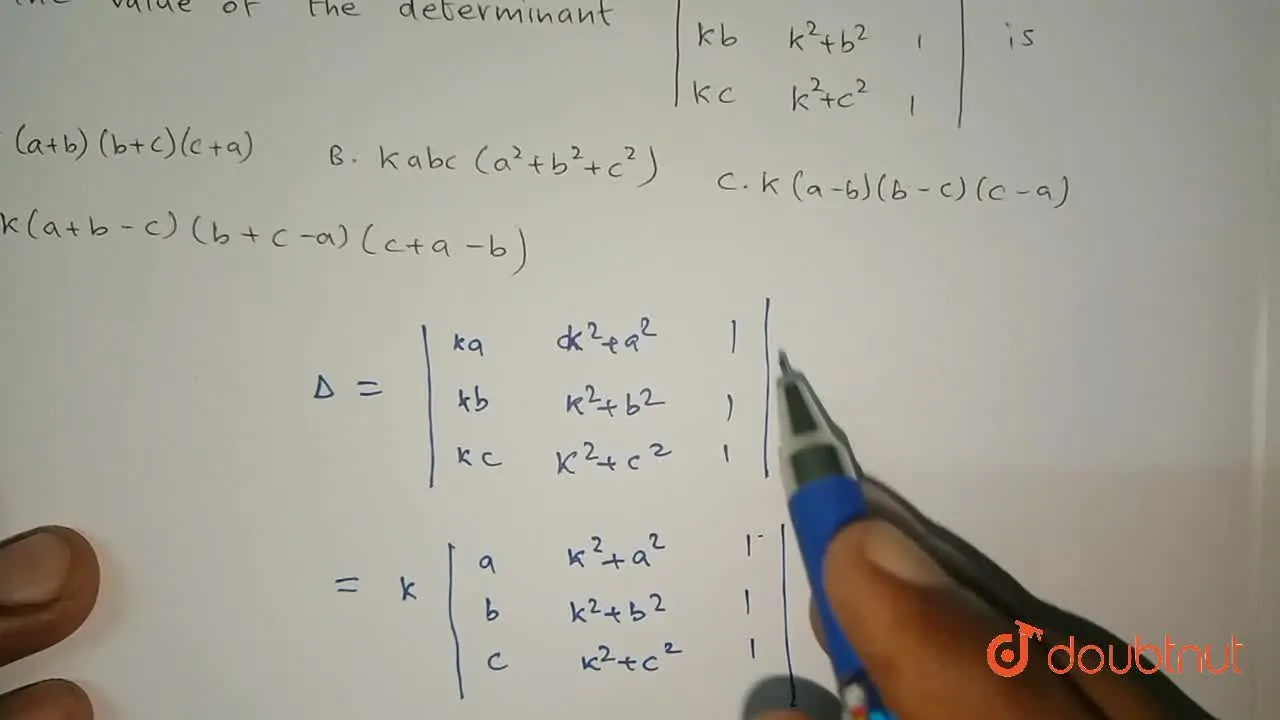The value of the determinant ∣∣ ∣ ∣∣kak2+a21kbk2+b21kck2+c21∣∣ ∣ ∣∣ is (A) k(a+b)(b+c)(c+a) (B) kabc(a2+b2+c2) (C) k(a−b)(b−c)(c−a) (D) k(a+b−c)(b+c−a)(c+a−b)Solution in Tamil
Step by step video & image solution for The value of the determinant |(k a, k^2+a^2, 1),(k b, k^2+b^2, 1),(k c, k^2+c^2, 1)| is (A) k(a+b)(b+c)(c+a) (B) k a b c(a^2+b^(2)+c^2) (C) k(a-b)(b-c)(c-a) (D) k(a+b-c)(b+c-a)(c+a-b) by Maths experts to help you in doubts & scoring excellent marks in Class 12 exams.
Related Playlists
Similar Questions
consider the fourth -degree polynomial equation
∣∣ ∣ ∣∣a1+b1xa1x2+b1c1a2+b2x2a2x2+b2c2a3+b3x2a3x2+b3c3∣∣ ∣ ∣∣=0
Without expanding the determinant find all the roots of the equation.04:38View SolutionFind |→a|and∣∣→b∣∣, if (→a+→b)⋅(→a−→b)=8and|→a|=8∣∣→b∣∣.
01:16View SolutionThe value of the determinant ∣∣ ∣ ∣∣kak2+a21kbk2+b21kck2+c21∣∣ ∣ ∣∣ is (A) k(a+b)(b+c)(c+a) (B) kabc(a2+b2+c2) (C) k(a−b)(b−c)(c−a) (D) k(a+b−c)(b+c−a)(c+a−b)
03:35View SolutionIf ab+c=bc+a=ca+b=K , then the value of K is ±12 (b) 12 or −1 (c) −1 (d) 12
05:56View SolutionWhat is the value of k, if ∣∣ ∣ ∣∣kb+cb2+c2kc+ac2+a2ka+ba2+b2∣∣ ∣ ∣∣=(a−b)(b−c)(c−a)?
03:31View SolutionIf ∣∣ ∣ ∣∣(a2+b2)/ccca(b2+c2)/aabb(c2+a2)/b∣∣ ∣ ∣∣=k(abc) then k=
05:08View SolutionIf Δ=∣∣ ∣ ∣∣1aa21bb21cc2∣∣ ∣ ∣∣=k(a−b)(b−c)(c−a) then k=
09:16View SolutionIf sinxa=cosxb=tanxc=k, then bc+1ck+ak1+bk is equal to (a) k(a+1a) (b) 1/k(a+1a) 1k2 (d) ak
05:59View SolutionThe value of the determinant ∣∣ ∣ ∣∣kak2+a21kbk2+b21kck2+c21∣∣ ∣ ∣∣ is (A) k(a+b)(b+c)(c+a) (B) kabc(a2+b2+c2) (C) k(a−b)(b−c)(c−a) (D) k(a+b−c)(b+c−a)(c+a−b)
07:24View SolutionIf sinxa=cosxb=tanxc=k, then bc+1ck+ak1+bk is equal to k(a+1a) (b) 1/k(a+1a) 1k2 (d) ak
07:56View SolutionThe value of the determinant ∣∣kak2+a21kbk2+b21kck2+c21∣∣ is k(a+b)(b+c)(c+a) kabc(a2+bf2+c2) k(a−b)(b−c)(c−a) k(a+b−c)(b+c−a)(c+a−b)
02:34View Solutionयदि ∣∣ ∣∣a−b−c 2a 2a 2bb−c−a 2b 2c 2cc−a−b∣∣ ∣∣=k(a+b+c)3 तो k =
05:46View SolutionThe determinant Δ=∣∣ ∣ ∣∣a2(a+b)abacabb2(a+k)bcacbcc2(1+k)∣∣ ∣ ∣∣is divisible by
03:51View SolutionIf in a triangle ABC,1+cosAa+1+cosBb+1cosCc =(k2(1+cosA)(1+cosB)1+cosCabc , then k is equal to 12√2R (b) 2R (c) 1R (d) none of these
02:17View SolutionIf (sinx)/a=(cosx)/b=(tanx)/c=k , then b c+1/(c k)+(a k)/(1+b k) is equal to k(a+1/a) (b) 1//k(a+1/a) 1/(k^2) (d) a/k
02:55View Solution


